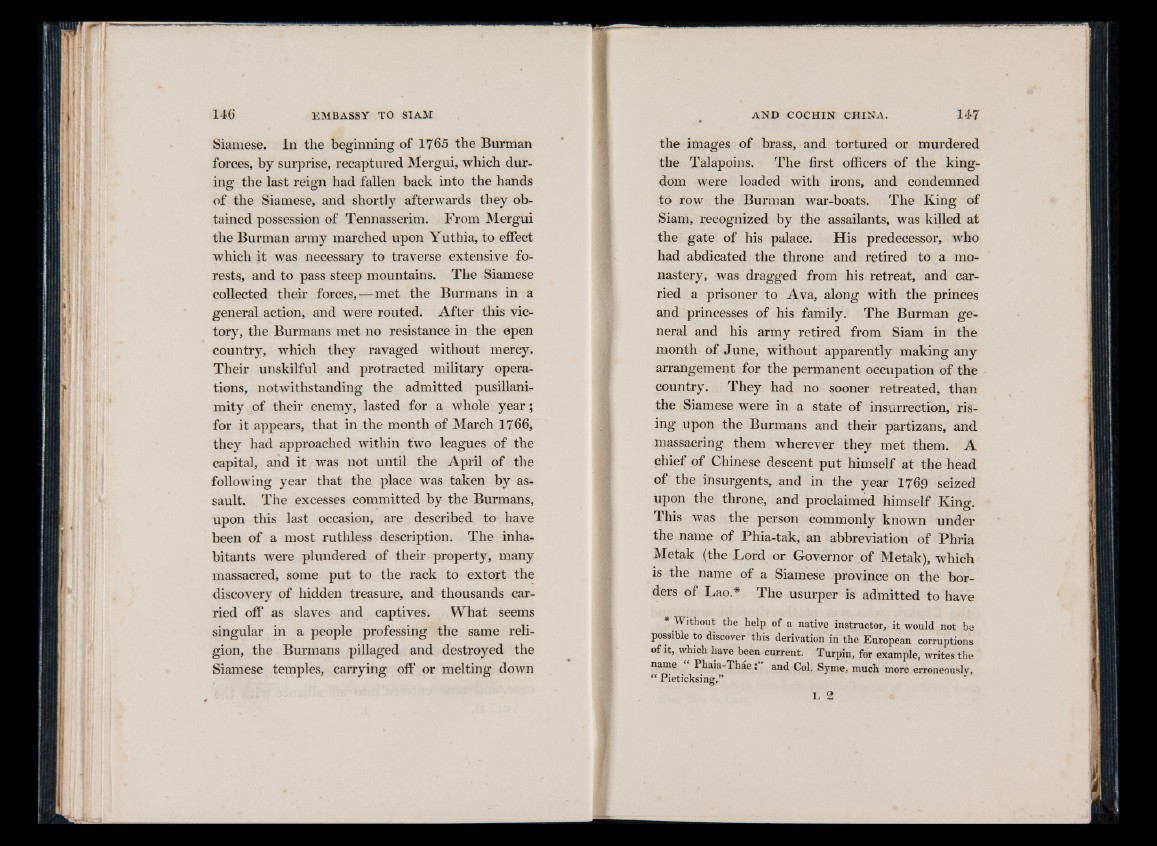
Siamese. In the beginning of 1765 the Burman
forces, by surprise, recaptured Mergui, which during
the last reign had fallen back into the hands
of the Siamese, and shortly afterwards they obtained
possession of Tennasserim. From Mergui
the Burman army marched upon Yuthia, to effect
which it was necessary to traverse extensive forests,
and to pass steep mountains. The Siamese
collected their forces,—met the Burmans in a
general action, and were routed. After this victory,
the Burmans met no resistance in the open
country, which they ravaged without mercy.
Their unskilful and protracted military operations,
notwithstanding the admitted pusillanimity
of their enemy, lasted for a whole y e a r;
for it appears, that in the month of March 1766,
they had approached within two leagues of the
capital, and it was not until the April of the
following year that the place was taken by assault.
The excesses committed by the Burmans,
upon this last occasion, are described to have
been of a most ruthless description. The inhabitants
were plundered of their property, many
massacred, some put to the rack to extort the
discovery of hidden treasure, and thousands carried
off as slaves and captives. What seems
singular in a people professing the same religion,
the Burmans pillaged and destroyed the
Siamese temples, carrying off or melting down
the images of brass, and tortured or murdered
the Talapoins. The first officers of the kingdom
were loaded with irons, and condemned
to row the Burman war-boats. The King of
Siam, recognized by the assailants, was killed at
the gate of his palace. His predecessor, who
had abdicated the throne and retired to a monastery,
was dragged from his retreat, and carried
a prisoner to Ava, along with the princes
and princesses of his family. The Burman general
and his army retired from Siam in the
month of June, without apparently making any
arrangement for the permanent occupation of the
country. They had no sooner retreated, than
the Siamese were in a state of insurrection, rising
upon the Burmans and their partizans, and
massacring them wherever they met them. A
chief of Chinese descent put himself at the head
of the insurgents, and in the year 1769 seized
upon the throne, and proclaimed himself King.
This was the person commonly known under
the name of Phia-tak, an abbreviation of Phria
Metak (the Lord or Governor of Metak), which
is the name of a Siamese province on the borders
of Lao.* The usurper is admitted to have
* Without the help of a native instructor, it would not be
possible to discover this derivation in the European corruptions
of it, which have been current. Turpin, for example, writes the
name “ Phaia-Th a e and Col. Syme, much more erroneously,
“ Pieticksing.”
L 2